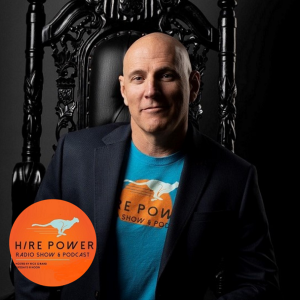
Will a subject matter expert be a better solution to hiring a leader for your company? We can all agree that there are different types of leaders. I am going to contend that the wiring of the leader you are hiring is more important than the pedigree that is brought to the table.
Our guest today: Ed Tyson, CEO of PerSynergy Consulting.
Ed Tyson is the chief executive officer of PerSynergy Consulting, architect of LeadershipSOPs, author of From Expert to Executive: Mastering the ABCs SOPS of Leading, and executive coach and consultant to both small niche brands and Fortune 500 companies. With a mastery of leadership refined throughout his years as a Marine, executive, coach and consultant, Ed guides executives, to key findings he has learned through intimate connections with a diverse array of leaders.
Today we are discussing
- How to identify the right leader for your startup
- What steps you should take to build the right job description to find the best candidate to fill this position
- What questions you should ask to ensure your candidate is the best fit for the job
Why not hire a leader in your startup?
I think we can all agree…
- ...leaders have a tremendous impact on your culture and process. The smaller the team, the larger the impact of each individual but particularly each leader.
- Deciding to add your next leader could either be that decision which propels you forward or sets you back.
- Leaders are more expensive and more capable of damaging your culture than individual contributors - so be certain it’s a leader you need, that you are clear about the challenge you need answered, and you are confident your candidate can indeed answer it.
- For example, there is a start-up client I am working with right now, just north of here in LA county. They are in the biotech space and have hired several key leaders from a much larger, global entity in the broader pharma space.
- The leaders they have brought on were extremely competent and well-positioned to lead the functions which they were hired to run. HOWEVER, they were not prepared to engage in both the breath of strategy and depth of tactics the job requires. Further, they are struggling with the lack of defined processes and support from other functions. Consequently, project timelines are being missed and their time-to-market will be impacted.
- Going the other direction on the 5, I have a client in San Diego county in the manufacturing business who is just reaching beyond the start-up phase. They have a relatively small corporate staff but almost a third of them are leaders with big titles but very small teams (with one or two subordinates a piece). Additionally, almost every leader is an internal promotion with no professional leadership experience – this founder has placed a lot of bets on continuing to cultivate raw talent but does not have the time to do it – which is admirable but making it difficult to grow beyond his current book of business or empower these leaders to really lead.
- At the end of the day, the team is too big and too inexperienced to comprehend and reach decisions without its leader (keeping the CEOs nose in the very parts of the business he has to escape to hit his growth targets).
- Both of these companies made the same mistakes (just differently). They both failed to clarify and challenge what they needed and ensure they got it.
- So again, my first tip is don’t hire a leader in the first place… unless and until you are confident you absolutely need a full-time person whose primary role is to structure, operate and perfect a community of effort.
- If that thought makes you nervous, if you're worried who will do the work, you might need someone to lead the work, not the people. Don’t fall into the trap of mistaking a technical lead, a senior subject-matter expert for a leader.
Rick’s Input
- Focus on correctly positioned talent
- Avoid vanity hires
How do we hire leaders then?
- Purpose of a Leader
- The purpose of adding a leader to your growing team is not to add to your subject-matter expertise, it is to ensure someone other than yourself wakes up every day focused on cultivating a willing, capable and sustainable community of effort. Leaders are no longer obsessed with their craft because every step a leader takes on the career ladder is away from their craft.
- Leaders are not obsessed with technical puzzles. They are obsessed with people puzzles. Their primary work functions are to structure, operate and perfect powerful communities of effort.
- Do they need to understand the work? You bet. But their work is different from the team’s work. And the better you understand that work, the work of a leader, the more likely you are to find the type of leader you need.
- Defining Your SCOPE
- For me, it all starts with understanding the SCOPE of the community of effort you need.
- SCOPE is an acronym which helps leaders remember the five most important architectural components of a community of effort. It stands for Strategy, Culture, Objectives, Purpose and Ecosystem. You can think of it as a replacement for the old mission / vision / values mantra which still permeates business schools today. In fact, Culture, Objectives and Purpose stand for exactly those same three components. The different being, the full SCOPE acronym adds the importance of understanding the players and interactions within your ecosystem and the strategies you craft by considering that ecosystem, how you deliver value to it (i.e. your purpose), the objectives you set (from both a visionary and near-term perspective) as well as the culture you have and the culture you’d like to have.
- Your best shot at getting the leader you need is taking your best shot at defining the company SCOPE and the departmental SCOPE for the team you want this leader to lead (and do it with your existing team if you can).
- Your clarity here will allow you to differential the team’s work from the work the leader must do to be successful. This will result in a rich, leadership-focused job description based on the real work of leading.
- Then you can use the interview to pressure test key concepts in your company and departmental SCOPEs across a broad set of applicants (think of it as free consultation) and dig into the how.
- Process Not Outcomes
- Don’t fall into the trap of listening to canned lists of outcomes your candidates come prepared to throw at you. Ask about the how, the process. How did they refine the SCOPE at their last job? How will they do it here? How will they stay in alignment with the departments to their right and left? How will they stay aligned with you? How will they translate it into clear work methods, roles and responsibilities, how will they structure rewards and recognition; how will they secure the knowledge and capabilities you need to succeed? What repeatable processes do they use to inspire and engage people, drive accountability, evolve the team, etc.?
- I think the most important thing is to gain insight into their own personal LeadershipSOPs – in other words, what are their standard operating procedures for structuring, operating and perfecting communities of effort?
Rick’s Nuggets
- Job descriptions
- Person type (builder, improver, maintainer)
- Performance metrics
- Evidence of past performance
- Performance tied to process
Key Takeaways:
- Don’t Hire a Leader in the First Place!
- Throw Away Your Job Description!
- Ignore Candidate Stories about Outcomes!
More Episodes
Create your
podcast in
minutes
- Full-featured podcast site
- Unlimited storage and bandwidth
- Comprehensive podcast stats
- Distribute to Apple Podcasts, Spotify, and more
- Make money with your podcast
It is Free
- Privacy Policy
- Cookie Policy
- Terms of Use
- Consent Preferences
- Copyright © 2015-2024 Podbean.com







